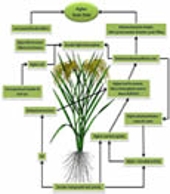This article in the Guardian newspaper 2/16/13 describes how poor farmers in what is described as India's poorest state are beating world records for rice and potato production using manure for fertilizer and intelligent horticultural techniques.
[T]he reason for the "super yields" is entirely down to a method of growing crops called System of Rice (or root) Intensification (SRI). It has dramatically increased yields with wheat, potatoes, sugar cane, yams, tomatoes, garlic, aubergine and many other crops and is being hailed as one of the most significant developments of the past 50 years for the world's 500 million small-scale farmers and the two billion people who depend on them.
Instead of planting three-week-old rice seedlings in clumps of three or four in waterlogged fields, as rice farmers around the world traditionally do, the Darveshpura farmers carefully nurture only half as many seeds, and then transplant the young plants into fields, one by one, when much younger. Additionally, they space them at 25cm intervals in a grid pattern, keep the soil much drier and carefully weed around the plants to allow air to their roots.
This is a "back to basics" approach that lets small rural farmers leverage their labor to maximize crop yields. Of course, the agricultural "experts" are poo-poohing this, saying that there is no machine that can plant the single baby rice seedlings and thus it's not feasible to actually, you know, feed the world. Luckily, the farmers aren't paying any attention--they are busy bringing in bigger crops than ever.
"It is a set of ideas, the absolute opposite to the first green revolution [of the 60s] which said that you had to change the genes and the soil nutrients to improve yields. That came at a tremendous ecological cost," says Uphoff. "Agriculture in the 21st century must be practised differently. Land and water resources are becoming scarcer, of poorer quality, or less reliable. Climatic conditions are in many places more adverse. SRI offers millions of disadvantaged households far better opportunities. Nobody is benefiting from this except the farmers; there are no patents, royalties or licensing fees."
So, it's not permaculture, but I do find it extremely encouraging to find that farmers are taking matters into their own hands and succeeding without the expensive seeds and chemicals that the so-called experts have told them they need to employ. If you read the article you'll find that this system of agriculture was developed in Madagascar in the 1980's but it has been slow to spread because, simply, there is no money to be made off the farmers, only by the farmers. Norman Uphoff, quoted above, has been working to share this information with farmers all over the planet.
He has a website here. 








